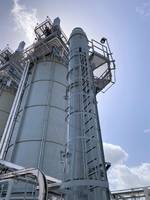CPI Installs Thermal Combustor System for Natural Gas Processing

Catalytic Products International (CPI) recently installed two (2) Thermal Combustor Systems (TCS) at a Southwest USA midstream natural gas processing facility for the abatement of hydrocarbon emissions from two natural gas fractionation trains.
Raw natural gas contains water, CO2, sulfur compounds and heavy hydrocarbons which must be removed before it is sent to the pipeline. Natural gas sources with large amounts of acid gases, also known as sour gases, must be treated and sweetened to meet natural gas pipeline specifications and sale contracts.
As part of an expansion at the fractionation complex, two identical Thermal Combustor Systems (TCS) were installed to eliminate hydrocarbon emissions from two new gas trains: an acid gas stream and a DSO (Disulfide Oil) Separator gas stream. The gas streams contain methane, ethane, propane, butanes, nitrogen, carbon dioxide (CO2), and dimethyl sulfide, among other compounds. The Thermal Combustor Systems will destroy the hydrocarbon emissions with 99.9% destruction rate efficiency (DRE).
Thermal Combustor Systems (TCS) are designed to burn safely or combust hydrocarbon vapor mixtures that have varying energy content where enclosed flares may fail. The TCS combines the simplicity of an enclosed flare with the robustness and proven performance of a thermal oxidizer.
Thermal Combustor Systems are custom designed for a particular process stream and can include forced draft or a usually drafted system along with a full complement of auxiliary devices to aid in performance and safety.
The TCS operation sequence begins by purging the entire system with fresh air. After purge, the TCS pilot and main burners are ignited and held in place until appropriate flame scanning safeties are met. Once flame safety requirements are met, process gas may be introduced to the TCS. The TCS system will automatically adjust to different volumes, concentrations, and heat values of the process gas. If the process gas does not have the energy to support combustion, natural gas may be added as a support fuel.
The introduction of process gas will increase the internal temperature within the combustion chamber. To control the temperature and facilitate combustion fresh air is added to the system. The fresh air can be naturally aspirated or forced into the system. The combustion air brought into the system ensures mixing, sufficient oxygen, and controlled temperature combustion providing the optimum VOC destruction efficiency.
Catalytic Products International (CPI) worked closely with the customer’s engineering consultant providing the design, supply and startup of the two Thermal Combustor Systems. The two Thermal Combustor Systems were custom designed for the particular gas trains and included a full complement of auxiliary devices to aid in performance and safety. Custom features include electrical components designed for Class 1 Division 2, oxygen (O2) analyzers, and a Temperature Safety System.
CPI has been “Enabling Clean Production Since 1969” and continues as a leading supplier of air pollution control equipment. CPI is at the forefront in providing industries including the oil and natural gas industry with solutions to their air pollution control needs.
Today, CPI partners with its customers as a trusted resource in resolving the most complex air pollution and energy conservation problems. We provide our customers with innovative and cost-conscious solutions to their most complex VOC, NOx, and Odor pollution challenges. Our equipment is also at work meeting energy conservation strategies and minimizing greenhouse gas (GHG) emissions.




